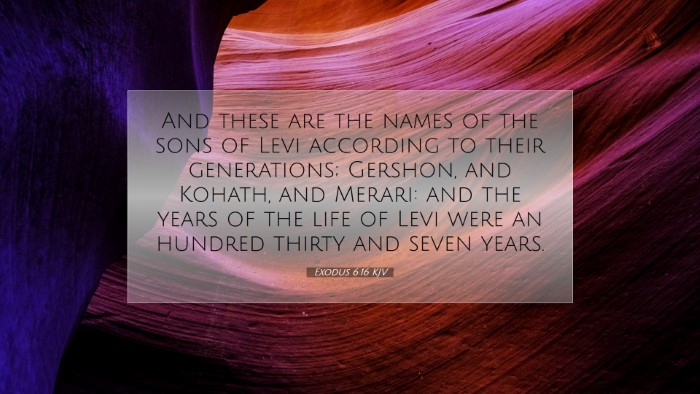Commentary on Exodus 6:16
Verse: Exodus 6:16 - "And these are the names of the sons of Levi according to their generations: Gershon, Kohath, and Merari; and the years of the life of Levi were a hundred thirty and seven years."
Introduction
The sixth chapter of Exodus marks a pivotal moment in the narrative of the Exodus, unfolding the significance of Levi's lineage. This verse serves not merely as a genealogical record, but as a profound testament to God's faithfulness and a foreshadowing of the roles that the Levites would play in Israel's covenantal service.
Insights from Commentaries
Matthew Henry's Commentary
Matthew Henry emphasizes the importance of genealogies in the Bible, noting that they establish God’s covenant with His people. In Exodus 6:16, the mention of the sons of Levi—Gershon, Kohath, and Merari—serves to underline the patriarchal foundations of the Israelite community.
Key Points:
- Divine Order: Henry highlights that the naming of the generations reflects God's order and purpose for His people. Each son's name holds significance in relation to their roles in the tabernacle service.
- Levi's Longevity: The lifespan of Levi—137 years—shows the blessing of longevity, a precursor to God’s covenant with Israel.
- Continuity of Faith: The genealogical records serve as a bridge linking the past with the present, reinforcing the continuity of faith from the patriarchs to the exodus experience.
Albert Barnes' Notes
Albert Barnes offers a meticulous examination of the historical context of Levi's sons. He points out that Levi’s descendants would be destined for a special service to God, indicating their role in the priestly functions of the future.
Key Observations:
- Roles of the Sons: Each son of Levi is associated with particular duties and responsibilities in the service of the tabernacle. For instance, Kohath's descendants would carry the holy objects.
- Spiritual Heritage: The mention of Levi's sons emphasizes the importance of spiritual heritage and the passing down of covenantal responsibilities through generations.
- Call to Holiness: Barnes notes how God's choice of the Levites illustrates the call to holiness and service, which underlies the Israelite identity and community structure.
Adam Clarke’s Commentary
Adam Clarke delves into the linguistic and cultural implications of the names listed. He argues that understanding these names involves exploring their meanings, which together reflect attributes of divine service, burden-bearing, and worship.
Reflections:
- Cultural Significance: Clarke emphasizes that names in this context are of deep personal and communal significance, often reflecting the character or role of the individual within the covenant family.
- Divine Favor: The longevity of Levi’s life according to Clarke symbolizes divine favor and the blessing of maintaining a sacred lineage.
- Legacy of Service: Clarke insists that the mention of these names encourages contemporary believers to consider their legacy in service and worship.
Theological Implications
This verse opens avenues for theological reflection and application. It prompts us to think about the sacredness of lineage, the significance of covenant relationships, and the call to serve God faithfully.
Key Theological Themes:
- The Call to Service: Just as Levi’s descendants were set apart for divine service, so are all believers called to serve in various capacities within the church today.
- Faithfulness Through Generations: The continuity of faith through generations stresses the importance of teaching and passing down the faith to future generations.
- The Role of Ancestors: Understanding our spiritual ancestry enriches our identity as believers and reminds us of the responsibilities entrusted to us.
Conclusion
Exodus 6:16, while presenting a genealogy, serves as a rich tapestry woven with themes of fidelity, service, and divine purpose. The insights drawn from ancient commentators illuminate the text for modern readers, inviting pastors, students, theologians, and Bible scholars to delve deeper into the spiritual inheritance that shapes our understanding of God’s unfolding narrative in history.


